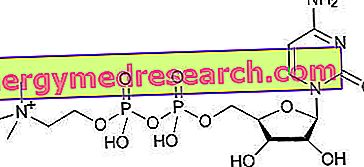Generality
Citicoline (also known as CDP-choline or cytidin 5'-diphosphocholine) is a particular molecule with psychostimulant and nootropic activity, ie it is able to increase the cognitive abilities of the individual. For this reason, the use of citicoline is mainly used as a supportive treatment in the case of cerebrovascular disorders and disorders that can cause alterations of the aforementioned capacities.
Examples of medicinal specialties containing Citicoline

- Citicolin®
- Difosfocin®
- Cidilin®
- Neuroton®
- Neurex®
Therapeutic indications
The use of citicoline is indicated in the supportive treatment of parkinsonian syndromes.
In addition, citicoline can also be used in cases of cerebrovascular disorders of degenerative, traumatic or atherosclerotic origin, which can lead to the onset of alterations in cognitive functions.
Warnings
During therapy with citicoline, if the patient is suffering from cerebral edema, it is necessary to administer - concurrently with the aforementioned molecule - drugs designed to reduce intracerebral pressure, such as corticosteroids or mannitol.
In the case in which, instead, the patient has endocranial hemorrhage, it is necessary that the dose of citicoline taken does not exceed 500 mg in a single administration, since it can cause an increase in blood flow in the brain. Therefore, in these cases, it is necessary to administer fractionated doses of active ingredient (usually, 100-200 mg from two to three times a day).
Finally, it should be remembered that when citicoline is administered intravenously, the injection should be made very slowly.
Interactions with other drugs
Citicoline is able to exert a synergistic action with levodopa (the active ingredient of choice in the treatment of Parkinson's disease), thus allowing the dosage to be reduced.
Furthermore, citicoline can be used in conjunction with perfusion fluids, anti-haemorrhagic drugs and anti-edema drugs.
At the moment there is no information about possible drug interactions between citicoline and other drugs.
However, before starting treatment with this active ingredient, it is always a good idea to inform your doctor if you are taking - or have recently been - any type of medication, including prescription-free medicines, over-the-counter medications and products herbal and homeopathic.
Side effects
At present, there are no known side effects caused by the intake of citicoline.
However, should any side effects of any kind occur, it is necessary to contact your doctor or pharmacist, who will immediately forward the report directly to the Italian Drug Agency (AIFA).
Action mechanism
As mentioned, citicoline is an active ingredient with nootropic activity. Nootropic substances generally act by promoting the production of neurotransmitters, providing the body with the molecules necessary for their synthesis.
Therefore, citicoline acts in a similar manner. This molecule, in fact, once taken, is metabolized leading to the formation of choline. The latter is a precursor of acetylcholine, one of the most important neurotransmitters of our nervous system, involved in numerous cognitive functions, such as, for example, memory and concentration.
The choline deriving from the metabolism of citicoline, therefore, can be used centrally for the production of acetylcholine, increasing its bioavailability and producing an improvement in the aforementioned cognitive abilities.
In addition, citicoline is also able to:
- Promote the synthesis of phospholipids and lecithin in particular;
- Increase cerebral blood flow;
- Explain a corrective action on the altered blood lipoprotein framework.
Method of use and Posology
Citicoline is available in pharmaceutical formulations suitable for intravenous administration and intramuscular administration.
When used intravenously, citicoline should only be administered by specialized personnel by drip infusion or by slow intravenous injection.
The dose of drug usually used for the supportive treatment of parkinsonian syndromes is 500-1000 mg per day, to be administered in a single dose, or in divided doses, intramuscularly, slowly intravenously or for intravenous drips.
However, the exact dose of citicoline to be administered to each patient will be established by the doctor on a strictly individual basis, depending on the health conditions of the same patient.
Pregnancy and breastfeeding
Since it cannot be excluded that the administration of citicoline may cause harm to the fetus and / or the infant, the use of this active ingredient in pregnant women and breast-feeding mothers should be carried out only and exclusively if the doctor considers it absolutely necessary.
Contraindications
The use of citicoline is contraindicated in case of known hypersensitivity to the citicoline itself or to other substances having a chemical structure similar to that of citicoline.




